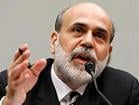Financial Markets
Markets need more regulation, Fed told
 Financial markets need to be more tightly regulated to prevent financial crises and quash perceptions that some firms are too big to fail and will be rescued by the government, central bankers and economists suggested at the Federal Reserve's annual policy conference.
Financial markets need to be more tightly regulated to prevent financial crises and quash perceptions that some firms are too big to fail and will be rescued by the government, central bankers and economists suggested at the Federal Reserve's annual policy conference.
Major changes are probably years away. In the meantime, as Fed Chairman Ben Bernanke noted, businesses and consumers are feeling the impact of the current financial crunch as economic growth softens and unemployment rises. The Treasury Department faces a possible bailout of mortgage giants Fannie Mae and Freddie Mac, and the Fed is continuing emergency lending to strapped banks.
"The crystal ball at this stage is unusually unclear, given that we are a year into this (financial) crisis," Stanley Fischer, governor of the Israeli central bank, said in closing remarks Saturday.
Policymakers tried to do several things at the conference, which focused on financial stability. One was to get a better understanding of the specific factors that caused credit markets worldwide to seize up a year ago as the U.S. housing market, and mortgage-backed bonds, started to sour.
Another was to examine the impact of central bank actions since the crisis began. The Fed has cut a key interest rate to 2% from 5.25% to bolster the economy, made a $30 billion loan to aid the sale of investment bank Bear Stearns to JPMorgan Chase and created special lending facilities.
The conference also looked at proposals for reform, including Bernanke's suggestion that the Fed take a broader, systemwide approach. Another plan by University of Chicago economist Raghuram Rajan and others would create a special insurance fund for banks that would be triggered at times of systemic distress, infusing capital to lenders.
Debate was sometimes heated.
Willem Buiter, a professor at the London School of Economics, argued that the Fed had been a sort of bumbling giant during the crisis, too eager to bend to the desires of Wall Street. In a thick paper, Buiter also suggested the USA needed an economic downturn to clear the financial toxins out of its system and get back on a stable footing.
"The Fed listens to Wall Street and believes what it hears," Buiter argued. Fed actions, including the Bear Stearns intervention, have sent the wrong signal to the markets and in the process the "likelihood and severity of future crises have been heightened … we shall pay the price for that."
Other economists countered that the Fed moves had been essential in stabilizing markets and preventing broader financial distress. Princeton economist Alan Blinder called the Fed's performance "pretty good" given the circumstances.
Bernanke acknowledged that Fed emergency actions posed long-term risks, citing the Bear Stearns episode as a reason for tighter regulation. Without tighter oversight, the markets could conclude that the government will bail out more institutions "possibly resulting in excessive risk-taking and yet greater systemic risk in the future."
Harvard economist Martin Feldstein said the economy was sliding toward a recession and that federal tax stimulus checks hadn't provided much boost. Columbia University professor Charles Calomaris argued that the economic threat of falling home prices had been overstated and the Fed should concentrate on tackling.
(Published by USA Today - august 25, 2008)